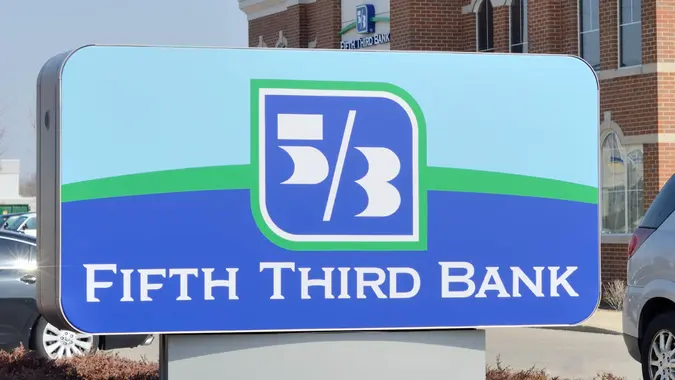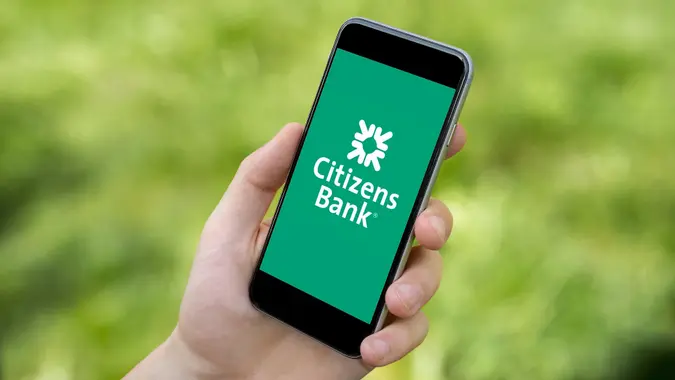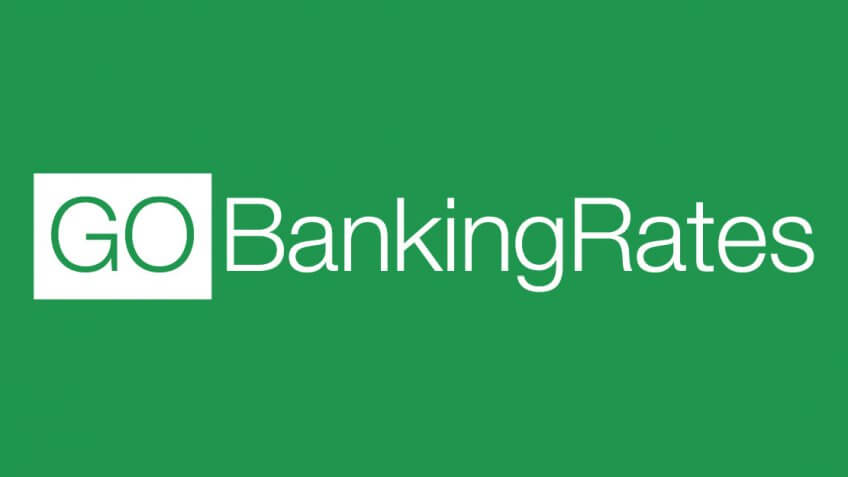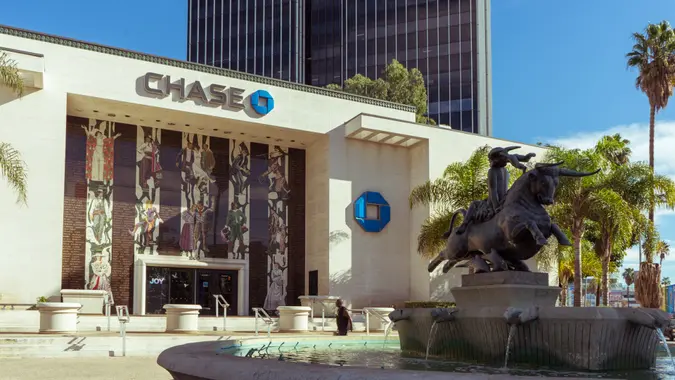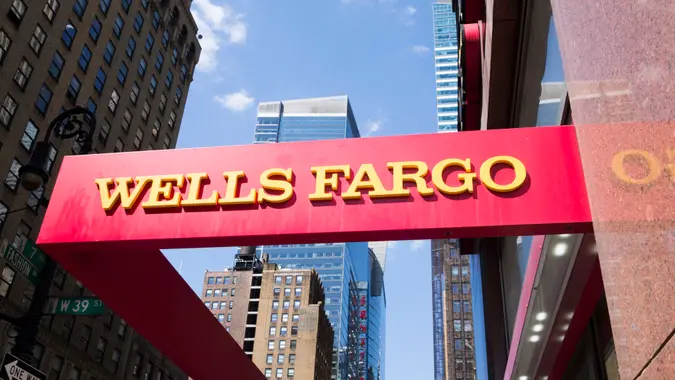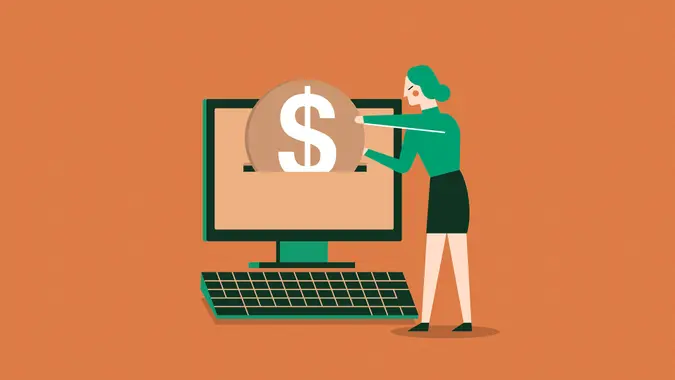Pros and Cons of Money Market Accounts: What To Know Before You Open One

Commitment to Our Readers
GOBankingRates' editorial team is committed to bringing you unbiased reviews and information. We use data-driven methodologies to evaluate financial products and services - our reviews and ratings are not influenced by advertisers. You can read more about our editorial guidelines and our products and services review methodology.

20 Years
Helping You Live Richer

Reviewed
by Experts

Trusted by
Millions of Readers
If you’re looking for a savings option that offers both growth and access, money market accounts might be on your radar. But are they the right fit for your financial goals?
Understanding the money market account pros and cons can help you make a smarter, more confident decision.
In this guide, we’ll break down the advantages of money market accounts, potential risks and how they stack up against other savings choices. Whether you’re new to saving or just reevaluating your options, here’s what you need to know.
What Is a Money Market Account?
A money market account (MMA) is a type of interest-bearing deposit account blending features of both a savings and checking account. You earn interest — usually at a higher rate than standard savings accounts — and have limited access to your funds via checks or debit cards.
Most money market accounts are insured up to $250,000 by the FDIC (for banks) or NCUA (for credit unions), adding a layer of protection for your cash.
Pros of Money Market Accounts
The benefits of money market accounts make them appealing to savers who want both safety and flexibility:
1. Higher Interest Rates
Money market accounts often offer better rates than traditional savings accounts, especially amid rising interest rates.
2. Limited Check Writing and Debit Access
Unlike typical savings accounts, MMAs may come with check-writing privileges or a debit card, making your funds easier to access.
3. FDIC/NCUA Insurance
Money market deposit accounts are considered low-risk because they’re typically insured up to $250,000 per depositor.
4. Great for Emergency Funds
If you want your emergency fund to earn interest but still be accessible, a money market account is a smart option.
Cons of Money Market Accounts
Despite the perks, there are some money market account disadvantages to keep in mind:
1. Transaction Limits
Federal guidelines may restrict MMAs to six withdrawals or transfers per month, which can be inconvenient for frequent users.
2. High Minimum Balances
Many MMAs require a high minimum balance to open the account or avoid monthly maintenance fees.
3. Lower Returns Than Investments
Compared to stock market or mutual fund investments, money market accounts may offer lower long-term returns.
4. Potential Fees
Failing to meet balance requirements or exceeding transaction limits can lead to fees that eat into your interest earnings.
When To Choose a Money Market Account
A money market account may be the right fit if:
- You want a safe place for your emergency fund
- You prefer easy access to your savings through checks or debit
- You’re holding a large cash balance and want to earn more than a basic savings account offers
Risks of a Money Market Account
Even insured accounts have limitations. These are the risks of a money market account to consider:
- Inflation Risk: Your returns might not keep pace with inflation, reducing your purchasing power over time.
- Fee Risk: Hidden fees and maintenance charges can chip away at your earnings.
- Opportunity Cost: Choosing a money market account over higher-yield investments could mean missing out on better returns.
How Money Market Accounts Compare to Other Savings Options
| Account Type | Interest Rate | Liquidity | Minimum Balance | Usage Flexibility |
|---|---|---|---|---|
| Money Market Account | Medium-High | High | High | Moderate (check writing allowed) |
| Traditional Savings Account | Low-Medium | High | Low | Limited |
| High-Yield Savings Account | High | High | Medium | Limited |
| Certificate of Deposit (CD) | High (locked-in) | Low | Varies | No access until maturity |
Compared to other options, money market savings account pros and cons land squarely in the middle, offering better rates than basic savings but less freedom and growth than CDs or investments.
Money Market Account Tips: How To Maximize Benefits
To make the most of a money market account:
- Review rates regularly and switch accounts if better options become available
- Compare rates: Look for the highest interest with the lowest fees
- Maintain the minimum balance to avoid penalties
- Use it for short-term savings goals or emergency funds
Do Your Research on Rates and Fees
You want to maximize and grow your savings. To do so, you need to find the highest interest rate on your money market account.
Make sure you research rates before deciding to invest in your money market. You also want to pay attention to promotional offers that banks and credit unions offer throughout the year.
Also, you don’t necessarily want to pay various fees associated with your money market account. Be certain to ask about fees before opening your account.
Maintain Minimum Balance Requirements
If your money market account requires you to maintain a certain minimum balance, make sure you can comply with this requirement.
Funds that drop below the minimum balance will likely trigger a penalty.
Don’t Be Afraid to Switch
You don’t need to stay wedded to the same money market account. Banks and credit unions regularly offer different interest rates on their money market accounts.
Compare these rates and if feasible switch to the carrier providing the higher interest rate.
Who Should Avoid Money Market Accounts?
While they’re great for some, MMAs aren’t ideal for everyone. You may want to avoid them if:
- You want higher returns and are comfortable with risk (consider ETFs or mutual funds)
- You don’t have enough to meet the minimum balance requirement
- You need frequent access to your cash beyond six withdrawals per month
Final Take to GO: Are Money Market Accounts Right for You?
The pros and cons of money market accounts depend on your financial goals. If you’re looking for a safe, interest-earning place for your emergency fund or short-term savings, and can maintain the minimum balance, an MMA can be a strong option.
But if you’re chasing higher returns or need more flexibility, consider a high-yield savings account or short-term CD instead.
Bottom line: Weigh the money market account advantages against the potential drawbacks and choose the savings tool that fits your lifestyle best.
FAQs: Money Market Account Pros and Cons
Here are the answers to some of the most frequently asked questions regarding money market account pros and cons:- What are the main benefits of a money market account?
- Higher interest rates, FDIC/NCUA insurance and limited check-writing access are the top advantages of a money market account.
- Are money market accounts FDIC insured?
- Yes. Most money market deposit accounts are insured up to $250,000 per depositor through the FDIC (banks) or NCUA (credit unions).
- What are the typical fees associated with money market accounts?
- Common fees include monthly maintenance charges, excess transaction fees and penalties for falling below the minimum balance.
- Can I lose money in a money market account?
- While the account is insured and not subject to market loss, fees and inflation risk can reduce your real returns over time.
- How does a money market account differ from a savings account?
- Money market accounts typically offer higher interest, check-writing privileges and require higher minimum balances compared to regular savings accounts.
Information is accurate as of May 22, 2025.
Editorial Note: This content is not provided by any entity covered in this article. Any opinions, analyses, reviews, ratings or recommendations expressed in this article are those of the author alone and have not been reviewed, approved or otherwise endorsed by any entity named in this article.
Editor's note: This article was produced via automated technology and then fine-tuned and verified for accuracy by a member of GOBankingRates' editorial team.
Our in-house research team and on-site financial experts work together to create content that’s accurate, impartial, and up to date. We fact-check every single statistic, quote and fact using trusted primary resources to make sure the information we provide is correct. You can learn more about GOBankingRates’ processes and standards in our editorial policy.
- CFPB "What is a money market account?"
- FDIC "Deposit Insurance"
- National Credit Union Administration "Share Insurance Coverage"
- U.S. Federal Reserve "Daily Interest Rates"
- Investor.gov "High-Yield Investment Programs"
 Written by
Written by  Edited by
Edited by 



